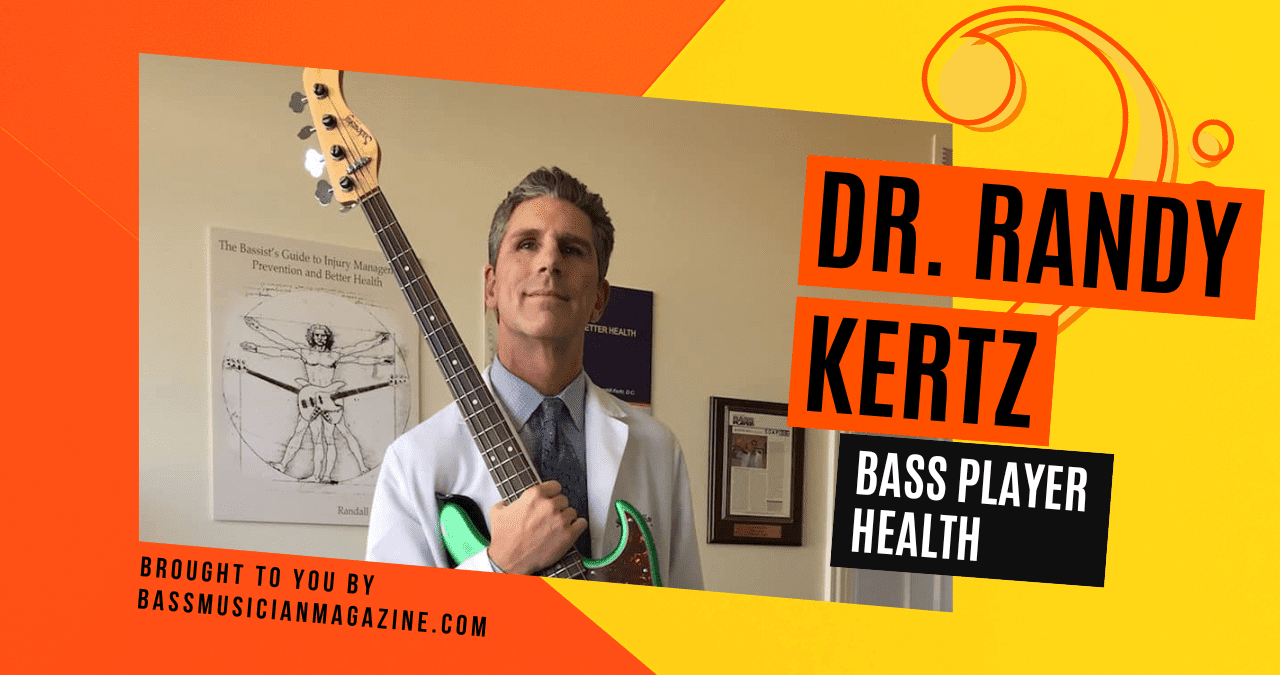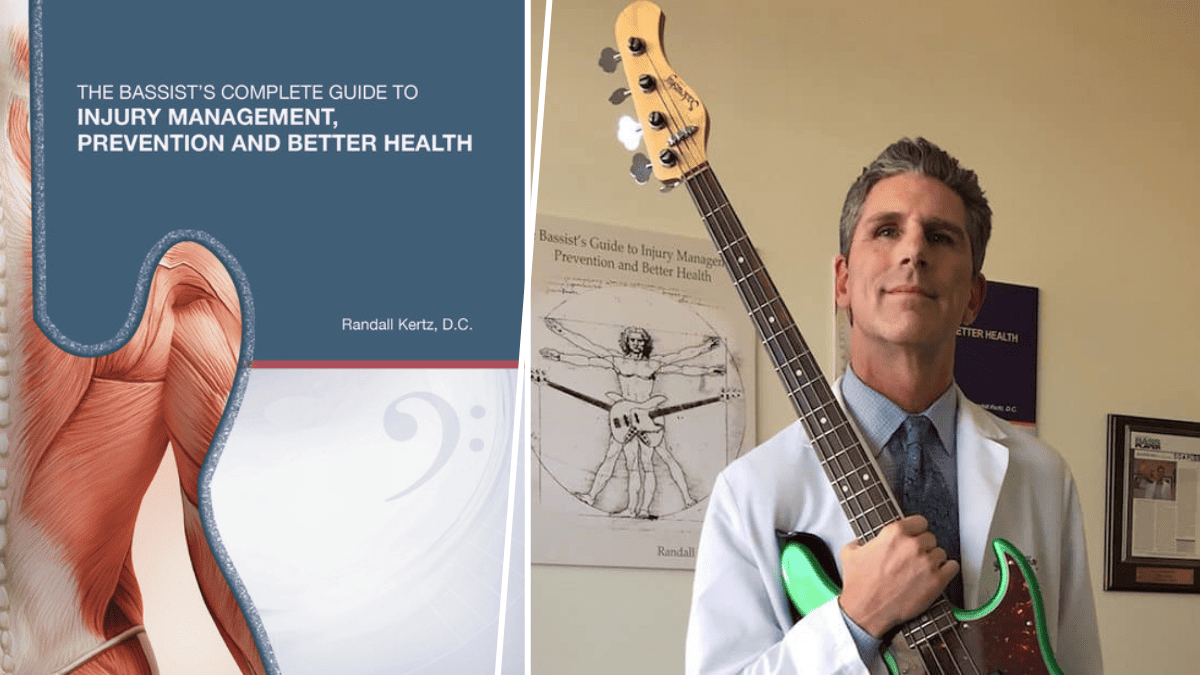Bass Player Health
Do You Need a Full-time Rockstar Physiotherapist on Tour?

Do You Need a Full-time Rockstar Physiotherapist on Tour? The Un-Healthy Price Bass Players Pay…
By Anna Achimowicz / Head Rockstar Physiotherapist at Performing Arts Medicine
So why don’t you have a full-time rockstar physiotherapist on tour?
Budget.
Almost every conversation with a tour manager starts like this…
Bass Player: Isn’t the bass player and the band’s health and ability to perform the first priority here?
Tour Manager: We get massage therapists on location from city to city… it’s okay… it works.
It’s not okay, and it doesn’t.
Nothing is more wrong with this statement. If there’s anything that the body of a bass player doesn’t want to tolerate is a lack of consistency. A random massage therapist in every city, a generalized treatment, massage, or soft tissue work, not to mention a quick chiropractic adjustment that will potentially leave you with consequences for years, with absolutely no knowledge of the individual’s needs or health priorities that are the cause of pain or injury. What’s even more important is how they’re going about performing.
A heavy solid-body bass or guitar strapped around one shoulder, plus pyro, backflips, metal cages, and explosives, for 60, 90, or more minutes for weeks on end with every night in travel and a mass of external factors. Let that just be the tip of the iceberg leading to all sorts of compensation mechanisms in the body. Bass players may hear ’tendonitis’ or ‘bad posture’ terms thrown at them or simple strain when looking for any medical help. No such thing, especially since the body is made to move, where its anatomical elements are properly stimulated through repetitive movement in order to be healthy and perform its function. So playing bass itself or muscle ‘weakness’ isn’t the case either. No, it’s not, and it doesn’t have much to do with training at all either. We’ll get to that.
Nothing against massage or soft tissue work and their representatives, but musicians and stage performers, especially those touring bass players are like high-class athletes, and their bodies undergo extreme strains and effort requiring specialized methods and techniques. This will not only be efficient in improving their playing, nerve responses, coordination, and activation but will especially address compensation and movement patterns that are specific to what bass players, actually do in their stage show in respect to the environment, their style of playing, surrounding and stage choreography, very physical or stationary way of playing.
The other element that is crucial is sustainability; a one-off massage without a specialist being consistent with working on a player’s body and his or her health with a directed strategy and controlled environment leads to potential injury risk. Although in the short term this can provide a relaxation or regeneration effect, the underlying causes of the problem are left untouched. Increased blood flow and tissue overstimulation in some cases are not required and can do more damage than help. Proper assessment of pain presenting while playing Is far more important for any symptoms while in static, sitting down, lying, or sleeping.
An individual approach to treatment when it comes to functional ‘lesions’ which is the vast majority unless a structural injury occurs, has a place. It usually always starts at the pelvis, and always has to do with improper nerve function and impulsion to the rest of the systems. Imagine a cable half plugged into your bass or amp, it has no chance to transmit the signal in its full 100% force. That won’t sound good. And last but not least, where it hurts is not where we should treat it first. Pain is a very intelligent bio-feedback system and a way of the body saying, hey something is wrong, I need assistance here!
So what does that mean exactly?
Well, say a player has pain in his cervical spine, the tension in one of the shoulders, overall back strain, knee joints ofter an issue after the performance, and an old ankle joint sprain from childhood that flares up every now and again. I can add that most of the places manifesting pain are not the source of the problem. Properly finding the cause, reversing it, and bringing the body into a natural balance with all its systems here ( muscle-skeletal, neurological, circulatory, lymphatic, digestive, no name a few), the body has the natural capacity to regenerate itself after any strain. And by strain I understand any kind of effort requiring activity, sleeping doesn’t count ( Performance, effort, gym training, rehearsal, training, or even normal daily activity, etc.)
Inconsistency, when it comes to a lack of specialized care over a player’s health, is one of the main causes of injury, overuse, and omitting the early symptoms such as pain or discomfort. As we know, we suck up, dose up on a bunch of Advil or reach for a quick-fix temporary solution that doctors or trainers are happy to provide at a hotel gym, or simply go in for a one-time massage or adjustment because it’s all that is offered. Multiplied by weeks, months, and years in one’s career is a bomb with a delay pedal on it. Something is going to give in at some point, because the nerve system is going to be compromised one way or another, functioning with the wrong settings. Just like your amp or badly leveled fret job, it starts with buzz and rattle, and then a cascade of problems arises.
Especially understanding the specifics of playing an instrument is miles away from sitting at a desk at a day job where motion and motorics are usually limited to the slight movement of the fingers and wrist in a static position for hours on end. No comparison in performance, and even greater when it comes to evaluating the cause of the problem a player points out. Session musicians and recording artists that however do spend hours playing and sitting down, face a whole other group of problems caused by dis-reactivity of muscles, circulatory issues which will manifest in migraines, digestive issues, vertigo, and the obvious lumbar and cervical spine issues. But a sitting bass player is a topic for a whole separate article.
How is this possible since a world tour is always a huge operation employing a mass group of crew, techs, promoters, bookers, managers, assistants, and managers who don’t have the budget for one person overlooking the most important element of a band’s performance?
Lack of awareness is the first element, ignorance, lack of understanding of how important a physio’s work actually is contributing to the performer’s well-being, and red flags that can turn into a potential injury and always do over time. And a whole bunch of stereotype thinking of doing things a certain way for decades in the touring industry. Luckily the time to change this starts now.
How can that be changed then?
Spreading awareness, just like we are having this conversation. Applying proper standards and explaining to people in charge when a tour for a band comes together, having a specialist like a rockstar physiotherapist is crucial for the whole operation. Not only the bass player who together with the drummer builds the rhythm section and unit driving the whole band forward.
After all, before ticket sales, gear, fancy amp stacks, backdrops, and explosions in the stage production satisfy the eyes of the masses, we need to come back to the core element where it all starts with. The body and the player himself. Healthy, in shape, and injury free being able to rock the stage for his or her audience. So before we get carried away with instruments, straps, cases, etc, we need to remember the player’s main instrument, has no spare parts. The integrity of the body, without surgical involvement, invasive treatment, or repairs involving permanent changes in one’s anatomy is crucial.
Why not give the amount of attention, fine detail tuning, and obsession we give to gear and our basses, to our own body and health as a player?
It’s never too late when you end up in good hands that have the proper expertise, qualifications, and proper tools to accommodate the extremes of a bass players life style.
Over the course of my stage career, which hits 22 years this year in 2022, I was also lucky to have started a medical career alongside, developing specialized methods of treatment directed at musicians, stage performers, dancers, actors, etc. Coming from two sides of the spectrum the western school book of anatomy, biomechanics, and physiology, but also everything the alternative approach to healing has to offer.
If you can afford a custom shop instrument, you can definitely afford a tailor-made health specialist that will work with maintaining your most prized possession, your own body, and its health. And your pain usually starts at the bass(e) and that would be at your pelvis.
You can find more information about how to book a session with me as well as Anna’s Activation Method, Physiotherapy for Rockstars and Body Management for bass players seminars at the links below:
achimowiczanna.wixsite.com/bandaid
facebook.com/PerformingArtsMedicineEU
facebook.com/AnnasActivationMethod
Interview With Bassist and Physiotherapist Anna Achimowicz
Bass Player Health
Preparing for Performance with Dr. Randy Kertz

Preparing for Performance…
This month we discuss how to prepare for a performance and easy strategies that go a long way.
Dr. Randall Kertz is the author of The Bassist’s Complete Guide to Injury Management, Prevention and Better Health. Click here to get your copy today!
View More Bass Health Articles
Bass Player Health
What is a Pinched Nerve? with Dr. Randy Kertz

What is a Pinched Nerve?
In this month’s video, we will cover how to tell if you have a pinched nerve and when to seek professional help.
Dr. Randall Kertz is the author of The Bassist’s Complete Guide to Injury Management, Prevention and Better Health. Click here to get your copy today!
View More Bass Health Articles
Bass Books
The Bassist’s Complete Guide to Injury Management, Prevention & Better Health

The Bassist’s Complete Guide to Injury Management, Prevention & Better Health is now available!

A compilation of Volumes 1 & 2 of the acclaimed Bassist’s Guide with 20+ pages of new interviews, techniques, and conditions, The Complete Guide puts everything in one convenient place.
Available at Amazon.com and from our friends at Bassline Publishing
Follow Dr. Kertz’s Bass Player Health at Bass Musician Magazine
Bass Player Health
Do You Have Trigger Finger? with Dr. Randy Kertz

Do You Have Trigger Finger?
In this month’s video, we will cover trigger finger and possible treatments.
Dr. Randall Kertz is the author of The Bassist’s Complete Guide to Injury Management, Prevention and Better Health. Click here to get your copy today!
View More Bass Health Articles
Bass Player Health
Play Every Note with Dr. Randy Kertz

Play Every Note…
In this month’s video, we will cover the best approach to practice on your bass fretboard.
Please make sure to cast your Vote for Dr. Kertz >>> CLICK HERE
Category: Audio Education Technology
Title: Injury Prevention & Management for Musicians – The Pianist’s Guide
Dr. Randall Kertz is the author of The Bassist’s Complete Guide to Injury Management, Prevention and Better Health. Click here to get your copy today!
View More Bass Health Articles











